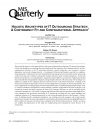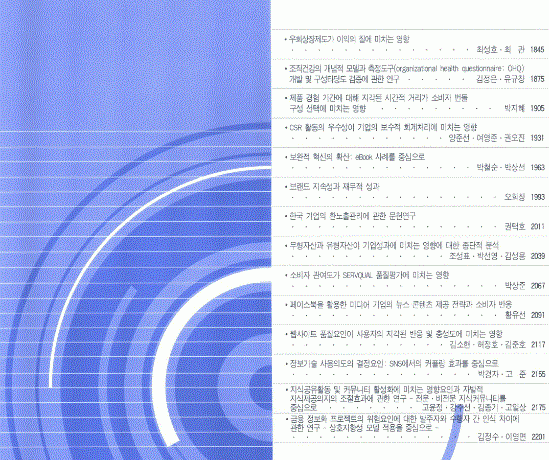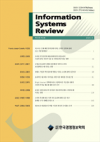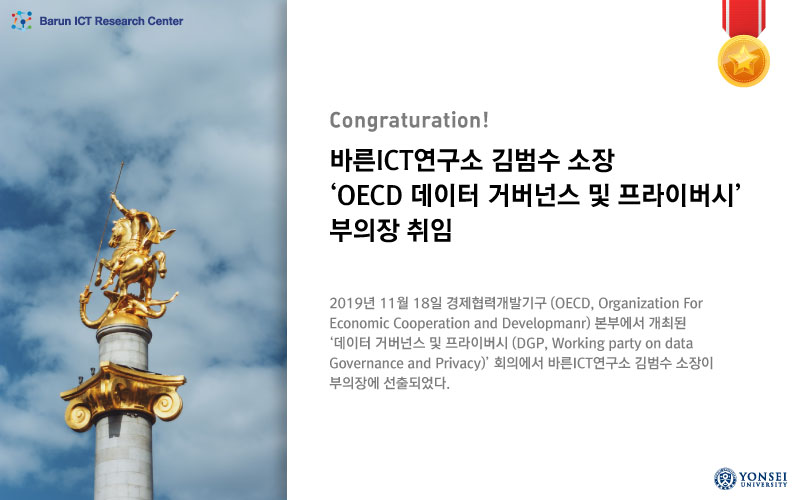[초록] 정보통신기술의 발전으로 오프라인에서 이루어지던 대부분의 활동들이 이젠 온라인에서 행해지고 있다. 온라인 환경에서의 대표적인 인증수단으로 비밀번호(Password)를 들 수 있으며, 대부분의 사람이 비밀번호를 최소한 하나 정도는 가지고 있다고 볼 수 있다. 최근 들어 해킹 혹은 비밀번호 관리 부주의로 인한 비밀번호 유출 사고가 다수 발생하고 있다. 비밀번호가 유출되면 개인정보 유출 혹은 사생활 침해와 같은 2차 피해로 이어지는 만큼 그 심각성이 상당하다고 할 수 있다. 이에 따라 기업은 사용자들에게 비밀번호를 주기적으로 변경할 것을 권고하고 있다. 하지만, 대다수가 비밀번호를 변경하고 있지 않는 실정이며, 이에 따라 비밀번호 유출 위험이 여전히 존재한다고 볼 수 있다. 본 연구에서는 공포 소구(Fear Appeals)와 메시지 프레이밍(Message Framing)이 비밀번호 변경행위를 증대시킬 수 있는지 알아보고자 하였다. 또한, 보호동기이론(PMT, Protection Motivation Theory)을 바탕으로 비밀번호 변경행위가 어떻게 이루어지는지 그 동기요인을 규명하고자 하였다. 연구결과, 공포 소구의 효과가 입증되었다. 공포 소구를 보여준 집단의 관여도(Involvement), 두려움(Fear), 변경의도가 더 높게 나타났다. 반면, 메시지 프레이밍 효과는 확인하지 못했다. 즉, 메시지 프레이밍에 따라 비밀번호 변경의도가 달라지지 않았다. 또한, 공포 소구와 메시지 프레이밍 간 상호작용 효과(Interaction Effect) 역시 발생하지 않았다. 추가적으로 구조방정식모델(SEM, Structural Equation Model) 분석을 한 결과, 두려움과 관여도가 비밀번호 변경행위에 긍정적인 영향을 주는 것으로 나타났다. 즉, 비밀번호 유출을 두려워할수록 혹은 비밀번호 변경이 자신과 관련이 있는 중요한 사항이라고 느낄수록 사용자들이 비밀번호를 변경한다고 볼 수 있다. 본 연구결과는 기업에서 공포 소구를 적극 활용해야 함을 의미한다고 볼 수 있다. 비밀번호 관리 부족으로 인해 개인적 피해는 물론이고 사회적으로 큰 혼란이 발생하는 만큼 공포 소구를 통해 이를 해결할 필요가 있는 것이다. 그리고 비록 그 효과를 입증하지는 못했지만, 메시지 프레이밍을 활용한 새로운 접근 방식을 시도했다는 점에서 학술적 의의가 있겠다고 할 수 있다. 또한, 관여도라는 기존에는 잘 다루지 않았던 요인을 새롭게 발굴했다는 점에서 이론적 기여가 있다고 볼 수 있다. 비밀번호 변경행위에 있어서 중요한 역할을 하는 것으로 나타난 만큼 향후에도 정보 시스템(Information System) 분야에서 관여도를 바탕으로 한 연구가 진행되기를 기대한다.
[Abstract] Due to the development of information & communication technology, most of the activities that were conducted offline are now performed online. A representative authentication method in an online environment is the password, and most of the people have at least one password. Recently, due to hacking or carelessness in managing passwords, there have been many accidents where passwords have been leaked. When passwords were leaked, it can cause serious secondary damages such as personal data breach and invasion of privacy. Therefore, companies are informing users to change their passwords regularly, but most of the users do not change them resulting in the risks of the leakage of such sensitive information. The purpose of this study is to investigate whether fear appeals and message framing will enhance the action of changing passwords by users. Furthermore, we identify the mechanism on how the behavior of changing passwords is enabled based on protection motivation theory (PMT). According to the results of the present study, Firstly, fear appeals was proven to be effective in encouraging users to change their passwords. The group provided with fear appeals showed higher involvement, fear, and intention to change passwords. Secondly, the message framing effect was not verified. In other words, the intention to change passwords did not appear differently according to message framing. Finally, there was no occurrence of interactive effect between fear appeals and message framing. Moreover, the structural equation model analysis was performed, and the result indicated that fear and involvement are affect the willingness of changing passwords. In other words, the more fear that the users feel on password leakage, or when the users feel that changing the password is an important matter, and then it means they are likely to change passwords. The findings of the current research imply the active utilization of fear appeals by the companies. As user’s lack of proper password security not only causes personal damage, but also big confusion to the society, which should be solved in advance through fear appeals. In addition, even though the effect was not proven, there is academic significance on the point that the new approach method of using message framing was attempted. Moreover, there is a theoretical contribution on having discovered new factor, involvement that was not applied in the extant study of the information system field. As this study showed that this factor plays an important role in the action of changing the password, we expect that research papers involving involvement will examine in the future.
[Abstract] Due to the development of information & communication technology, most of the activities that were conducted offline are now performed online. A representative authentication method in an online environment is the password, and most of the people have at least one password. Recently, due to hacking or carelessness in managing passwords, there have been many accidents where passwords have been leaked. When passwords were leaked, it can cause serious secondary damages such as personal data breach and invasion of privacy. Therefore, companies are informing users to change their passwords regularly, but most of the users do not change them resulting in the risks of the leakage of such sensitive information. The purpose of this study is to investigate whether fear appeals and message framing will enhance the action of changing passwords by users. Furthermore, we identify the mechanism on how the behavior of changing passwords is enabled based on protection motivation theory (PMT). According to the results of the present study, Firstly, fear appeals was proven to be effective in encouraging users to change their passwords. The group provided with fear appeals showed higher involvement, fear, and intention to change passwords. Secondly, the message framing effect was not verified. In other words, the intention to change passwords did not appear differently according to message framing. Finally, there was no occurrence of interactive effect between fear appeals and message framing. Moreover, the structural equation model analysis was performed, and the result indicated that fear and involvement are affect the willingness of changing passwords. In other words, the more fear that the users feel on password leakage, or when the users feel that changing the password is an important matter, and then it means they are likely to change passwords. The findings of the current research imply the active utilization of fear appeals by the companies. As user’s lack of proper password security not only causes personal damage, but also big confusion to the society, which should be solved in advance through fear appeals. In addition, even though the effect was not proven, there is academic significance on the point that the new approach method of using message framing was attempted. Moreover, there is a theoretical contribution on having discovered new factor, involvement that was not applied in the extant study of the information system field. As this study showed that this factor plays an important role in the action of changing the password, we expect that research papers involving involvement will examine in the future.






